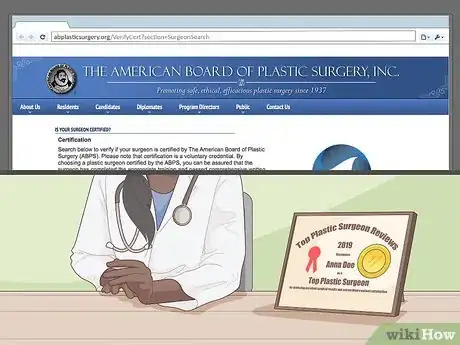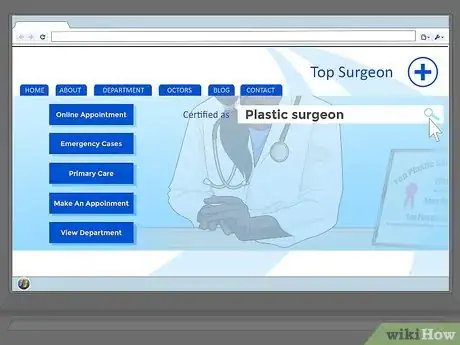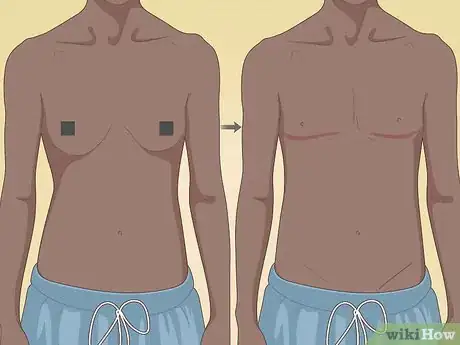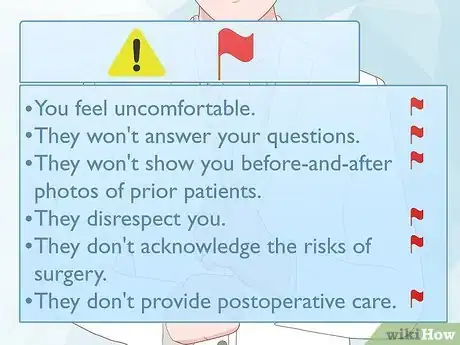This article was written by Scott Mosser, MD and by wikiHow staff writer, Danielle Blinka, MA, MPA. Dr. Scott Mosser is a board certified Plastic Surgeon based in San Francisco, California. Dr. Mosser is the Founder of the Gender Confirmation Center, a clinic dedicated exclusively to transgender surgeries. He received his MD from Baylor University, completed his residency in Plastic Surgery at Case Western Reserve University, and finished his fellowship in Aesthetic Surgery under Dr. John Q. Owsley, MD. He is a cofounder of the American Society of Gender Surgeons, a member of the American Society of Plastic Surgeons (ASPS), is a member of WPATH (World Professional Association of Transgender Health) and the United States Professional Association of Transgender Health (USPATH).
There are 12 references cited in this article, which can be found at the bottom of the page.
This article has been viewed 6,654 times.
Getting top surgery is an exciting part of your transition because it will change the look of your entire body. During your procedure, your surgeon will either remove your breast tissue to give you a more masculine or nonbinary figure, or they will insert implants to enhance your curves for a more feminine appearance.[1] Like other surgeries, top surgery carries serious risks, so it's important to pick a great and fully-qualified surgeon. Get started by finding board-certified plastic surgeons in your area that perform top surgery, or search more widely if you are willing to travel to get your surgery. Then, evaluate your options to identify your top choice. Finally, talk to the surgeon you're considering to make sure they're the right fit for you.
Steps
Finding Potential Surgeons
-
1Ask your doctor or therapist for a referral. You may be able to get a referral to a surgeon from your primary care physician or your therapist. Talk to them to find out if they can recommend a surgeon who's helped their prior patients.[2]
- If you've been working with a therapist to help you through your transition, they may also be able to help you pick your surgeon.
-
2Talk to your friends who've had top surgery if you have any. Ask your friends which surgeon did their top surgery. Then, ask if they're satisfied with the results and if they’d use the same surgeon again. Additionally, find out if they had any issues or concerns with their surgeon, the procedure, or their recovery process.[3]
- You might also visit online forums to look for people in your area who've gotten top surgery. Then, talk to them about who did their procedure and how it went.
Advertisement -
3Search for doctors in your area with experience doing top surgery. As you're researching surgeons, if there are any doctors who specialize in top surgery, move them to the top of your list. It's important that your surgeon has prior experience providing gender-affirming procedures, and that they are committed to the trans community outside of their work as a surgeon.[4]
- Top surgery is different from a typical breast augmentation or reduction. For FTM/N transitions, you want a doctor who's skilled at removing all of the breast tissue and reconstructing your chest to look masculine. For MTF transitions, you want a doctor who can give you the best implants for your build and skin elasticity while keeping your breasts natural-looking.
- Most doctors will list their expertise on their website.
Evaluating Your Options
-
1Make sure the surgeon is board certified as a plastic surgeon. Using a board certified plastic surgeon is essential for getting the care you need. Visit the medical board website to check if your doctor is certified. Alternatively, check doctor rating sites to see if your doctor's certification status is listed. If your doctor isn't listed as certified online, ask them to show you their certification paperwork.[5]
- Your doctor might not be listed as certified online if they're currently in the process of getting re-certified. However, they will have paperwork to show you.
- In the United States, surgeons who do top surgery are certified by the American Board of Plastic Surgery. You can check their certification here: https://www.abplasticsurgery.org/VerifyCert?section=SurgeonSearch
-
2Ask if thee surgical facility is accredited by the state or national agency. Ask the doctors you're considering where they will perform your surgery. Find out which state or national agency accredits surgical facilities in your area. Then, make sure the facility where your surgeon will perform your procedure is fully accredited.[6]
- In the United States, you can check with the American College of Surgeons to make sure your facility is accredited.[7]
-
3Make sure the surgeon you're considering has hospital privileges. Hospitals do background checks and record reviews before they grant hospital privileges. If your surgeon has hospital privileges, it means they were properly vetted. Additionally, your doctor will be able to better serve you in the case of complications if they can admit you to the hospital. Check your doctor's website or call their office to check that they have hospital privileges.[8]
- If your doctor doesn't have hospital privileges, it's a considerable red flag. It might be a sign they were not be able to pass the hospital's rigid approval process.
-
4Research the doctor to check their record. Do an online search on your surgeon's name to see what comes up. Read any articles about them to make sure there's nothing concerning in their past. Then, look for your doctor on the medical board website to make sure they're in good standing.[9]
- Look for news articles that mention the doctor.
- Check for malpractice suits, but understand that they are fairly common. Lawsuits are part of the public record, usually searchable on the city's website where their practice is located. Though not all malpractice cases that are filed have merit, look for cases that make you concerned, and talk to the doctor about what happened if you're worried.
- Visit the Federation of State Medical Boards' website at fsmb.org. Often for free or for a small fee, they'll provide you the doctor's profile and any disciplinary actions taken against them.
-
5Read online reviews from prior patients. Look for reviews on websites like Google, Yelp, and Healthgrades. Consider how many good and bad reviews the surgeon has, as well as what prior patients said about them. Pay special attention to patients who underwent top surgery and those who had a similar body type to yours.[10]
- If you see a review that concerns you, ask the doctor about it or look for a doctor who feels like a better fit.
-
6Look at before-and-after photos of patients your size. Check your doctor's website for before-and-after photos. If you don't see photos on their website, contact the doctor's office to ask for photos. Compare the before-and-after photos to make sure you like the results the doctor provided to their patients. Additionally, identify patients who have similar proportions to you so you can get an idea of what your results might look like.[11]
- If you ask for photos, tell the staff how tall you are, how much you weigh, and your current chest measurements. Then, ask them to send you photos of patients who have a similar build. This will give you a better idea of what the doctor might be able to do for you.
Talking to Your Doctor
-
1Attend a top surgery consultation with your preferred surgeon. Once you've identified your top choice, make an appointment for a transmasculine or transfeminine consultation. During your consultation, your surgeon will talk to you about the surgery, your preferences, and your health profile. They may also take photos and measurements of your chest. During the consultation, be honest, and be complete. Anything you hold back on for any reason might compromise your health or the care you're surgeon's team can provide. Talk to the doctor about the following:[12]
- The progress of your transition
- Your surgical goals
- Any medical conditions and drug allergies you have
- Medications, vitamins, and supplements you're taking
- Your alcohol, tobacco, and drug use
- Prior surgeries you've had
- Prior hospitalizations
- Your treatment options
- Potential top surgery complications
-
2Ask the surgeon about their past experience and expertise. You have a right to ask your doctor questions, and they should be happy to discuss any concerns you have. Bring a list of questions to your consultation and ask any questions that come to you during your discussion with your doctor. Additionally, call your doctor if you think of additional questions later. You might ask questions like the following:[13]
- Are you board-certified in plastic surgery?
- How may top surgeries have you performed?
- How many years have you been doing gender surgery?
- Are you a member of the World Professional Association for Transgender Health?
- How long will the recovery take and what are the recovery milestones?
- What will happen if I have complications?
- What are my options if there are concerns about the results after surgery?
- How much will the procedure cost me?
-
3Look for red flags that they might be a bad fit for you. Surgery carries risks, so it's important that you pick a surgeon you can entrust your health to. Pay close attention to how the doctor treats you and how comfortable you feel as their patient. You should feel extraordinarily safe and respected during your consultation, and ideally with their entire team. If anything feels wrong about your doctor, it might be best to look for another surgeon. Here are some red flags to watch for:[14]
- You feel uncomfortable.
- They won't answer your questions.
- They won't show you before-and-after photos of prior patients.
- They disrespect you or they seem disingenuous with their respect.
- They don't acknowledge the risks of surgery.
Expert Q&A
-
QuestionCan top surgery be covered by insurance?
 Scott Mosser, MDDr. Scott Mosser is a board certified Plastic Surgeon based in San Francisco, California. Dr. Mosser is the Founder of the Gender Confirmation Center, a clinic dedicated exclusively to transgender surgeries. He received his MD from Baylor University, completed his residency in Plastic Surgery at Case Western Reserve University, and finished his fellowship in Aesthetic Surgery under Dr. John Q. Owsley, MD. He is a cofounder of the American Society of Gender Surgeons, a member of the American Society of Plastic Surgeons (ASPS), is a member of WPATH (World Professional Association of Transgender Health) and the United States Professional Association of Transgender Health (USPATH).
Scott Mosser, MDDr. Scott Mosser is a board certified Plastic Surgeon based in San Francisco, California. Dr. Mosser is the Founder of the Gender Confirmation Center, a clinic dedicated exclusively to transgender surgeries. He received his MD from Baylor University, completed his residency in Plastic Surgery at Case Western Reserve University, and finished his fellowship in Aesthetic Surgery under Dr. John Q. Owsley, MD. He is a cofounder of the American Society of Gender Surgeons, a member of the American Society of Plastic Surgeons (ASPS), is a member of WPATH (World Professional Association of Transgender Health) and the United States Professional Association of Transgender Health (USPATH).
Board Certified Plastic Surgeon In some cases, yes. Ask your doctor if insurance may help cover some of the costs of the procedure. Bring your insurance card to your consultation, and talk to your doctor about how much your insurance company will pay. Many insurance companies will cover a portion or even the total cost of top surgery.
In some cases, yes. Ask your doctor if insurance may help cover some of the costs of the procedure. Bring your insurance card to your consultation, and talk to your doctor about how much your insurance company will pay. Many insurance companies will cover a portion or even the total cost of top surgery. -
QuestionWhat can I expect after a consultation?
 Scott Mosser, MDDr. Scott Mosser is a board certified Plastic Surgeon based in San Francisco, California. Dr. Mosser is the Founder of the Gender Confirmation Center, a clinic dedicated exclusively to transgender surgeries. He received his MD from Baylor University, completed his residency in Plastic Surgery at Case Western Reserve University, and finished his fellowship in Aesthetic Surgery under Dr. John Q. Owsley, MD. He is a cofounder of the American Society of Gender Surgeons, a member of the American Society of Plastic Surgeons (ASPS), is a member of WPATH (World Professional Association of Transgender Health) and the United States Professional Association of Transgender Health (USPATH).
Scott Mosser, MDDr. Scott Mosser is a board certified Plastic Surgeon based in San Francisco, California. Dr. Mosser is the Founder of the Gender Confirmation Center, a clinic dedicated exclusively to transgender surgeries. He received his MD from Baylor University, completed his residency in Plastic Surgery at Case Western Reserve University, and finished his fellowship in Aesthetic Surgery under Dr. John Q. Owsley, MD. He is a cofounder of the American Society of Gender Surgeons, a member of the American Society of Plastic Surgeons (ASPS), is a member of WPATH (World Professional Association of Transgender Health) and the United States Professional Association of Transgender Health (USPATH).
Board Certified Plastic Surgeon You can schedule your surgery. After your consultation, ensure that you feel confident with your surgeon before you make a final decision.
You can schedule your surgery. After your consultation, ensure that you feel confident with your surgeon before you make a final decision.
Warnings
- Like all surgeries, top surgery carries some risks. These include bleeding, infection, poor healing of your stitches, hematoma, loss of nipple sensation, loss of your nipple and areola, and anesthesia risks.[18]⧼thumbs_response⧽
References
- ↑ https://www.mayoclinic.org/tests-procedures/top-surgery-for-transgender-men/about/pac-20469462
- ↑ http://studenthealth.sa.ucsb.edu/docs/default-source/lgbtqi-docs/masc-top-surgery-guide.pdf?sfvrsn=2571f5ab_2
- ↑ https://www.ftmtopsurgery.ca/blog/ftm-faq/choose-right-doctor-ftm-top-surgery/
- ↑ https://www.topsurgery.net/faq/
- ↑ https://www.americanboardcosmeticsurgery.org/patient-resources/choosing-a-cosmetic-surgeon/
- ↑ https://www.plasticsurgery.org/reconstructive-procedures/transmasculine-top-surgery/questions
- ↑ https://www.facs.org/education/patient-education/find/facility-accreditation
- ↑ https://www.topsurgery.net/how-to-research-surgeon-background-credentials.htm
- ↑ http://studenthealth.sa.ucsb.edu/docs/default-source/lgbtqi-docs/masc-top-surgery-guide.pdf?sfvrsn=2571f5ab_2
- ↑ https://www.americanboardcosmeticsurgery.org/patient-resources/choosing-a-cosmetic-surgeon/
- ↑ https://www.americanboardcosmeticsurgery.org/patient-resources/choosing-a-cosmetic-surgeon/
- ↑ https://www.plasticsurgery.org/reconstructive-procedures/transmasculine-top-surgery/consultation
- ↑ https://www.topsurgery.net/questions-to-ask-at-top-surgery-consult.htm
- ↑ https://www.americanboardcosmeticsurgery.org/patient-resources/choosing-a-cosmetic-surgeon/
- ↑ https://www.topsurgery.net/costs/
- ↑ https://www.topsurgery.net/faq/
- ↑ http://studenthealth.sa.ucsb.edu/docs/default-source/lgbtqi-docs/masc-top-surgery-guide.pdf?sfvrsn=2571f5ab_2
- ↑ https://www.plasticsurgery.org/reconstructive-procedures/transmasculine-top-surgery/safety



















































Medical Disclaimer
The content of this article is not intended to be a substitute for professional medical advice, examination, diagnosis, or treatment. You should always contact your doctor or other qualified healthcare professional before starting, changing, or stopping any kind of health treatment.
Read More...